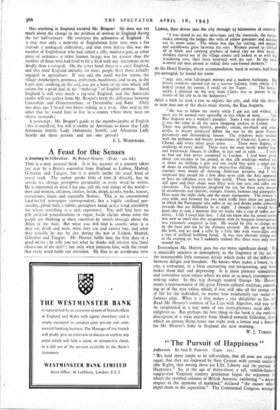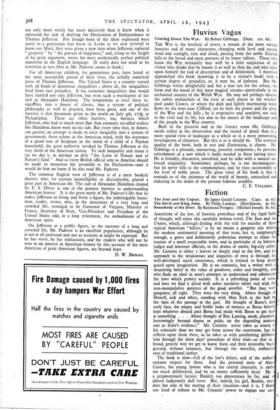" The Pursuit of Happiness ff
Jefferson. By Saul K. Padover. (Cape. us.)
" WE hold these truths to be self-evident, that all men are treat equal, that they are endowed by their Creator with certain unalien able Rights, that among these are Life; Liberty and the pursuit Happiness." So, at the age of thirty-three, a tall, reddish-haire tongue-tied Virginian country gentleman began the argument b which the revolted colonies of British America, exhibiting " a dece respect to the opinions of mankind," declared " the causes whit impel them to the separation." The Continental Congress wrough not only more wisely but more decisively than it knew when it entrusted the task of drafting the Declaration of Independence to Thomas Jefferson. For though none of the ideas expressed were novel to a generation that knew its Locke as we now pretend to know our Marx, they were given a new turn when Jefferson replaced " property " by " the pursuit of happiness," and, rising to the height of his great argument, wrote the most aesthetically perfect political manifesto in the English language. (It really does not need to be rewritten as vers libre as Mr. Padover seems to think.) For all American children, for generations past, have heard at the most susceptible period of their lives, the artfully contrived prose of Thomas Jefferson. The United States is a country cursed with all kinds of disastrous inequalities ; above all, the inequalities bred from race prejudice. It has economic inequalities that would have startled not only Jefferson, but even such a worshipper of the rich as Alexander Hamilton. The temptations to erect these in- equalities into a theory of classes, into a system of political philosophy as well as practice, have been great, and one of the barriers is that document given to the world on July 4th, I77b, at Philadelphia. There are other barriers, too, barriers which Jefferson, who had so much more flair than romantic so-called realists like Hamilton, knew were on his side. But every time that, in Ameri- can society, an attempt is made to erect inequality into a system of government, there echoes in the American mind, with the overtones of.a proof text of Scripture in the mind of a child of a Puritan household, the great authority invoked by Thomas Jefferson at the very birth of the American nation. To seek inequality and ensue it (as we do) is to attempt to defy " the Laws of Nature and of Nature's God." And so every British official sent to America should be made to memorise the preamble to the Declaration—and it would do him no harm if he also read Mr. Padover.
The common English view of Jefferson is of a mere bookish theorist who, for reasons unintelligible or discreditable, played a great part in American life. The cult of Alexander Hamilton created by F. S. Oliver is one of the greatest barriers to understanding American history. It is the great merit of Mr. Padover's life that he makes Jefferson so living and lively a figure, the indefatigable horse- man, reader, writer, who, in the interstices of a very long and crowded life, managed to be Governor of Virginia, Minister to France, Secretary of State, Vice-President and President of the United States and, in a long retirement, the embodiment of the American spirit.
On Jefferson as a public figure, as the narrator of a long and crowded life, Mr. Padover is an excellent populariser, although he is not at all profound and not as accurate as might be expected. But he has verve, he has enthusiasm, and the readers who will not be won to an interest in American history by this account of the most American of great American figures, are beyond hope.
D. W. BROGAN.



























 Previous page
Previous page